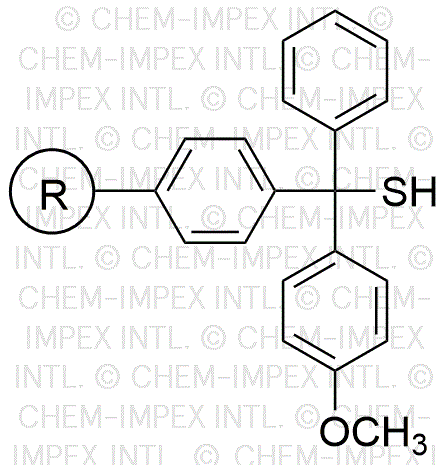Thiol 4-methoxy trityl resin is widely utilized in research focused on:
- Solid-Phase Peptide Synthesis: This resin serves as a support for synthesizing peptides, allowing for efficient coupling of amino acids and facilitating the purification process.
- Drug Discovery: It is employed in the development of small molecule libraries, enabling researchers to explore potential drug candidates through high-throughput screening.
- Bioconjugation: The resin can be used to attach biomolecules, such as proteins or nucleic acids, to surfaces or other compounds, enhancing the functionality of diagnostic tools.
- Analytical Chemistry: It aids in the preparation of samples for chromatographic analysis, improving the separation and identification of complex mixtures.
- Material Science: The resin is applied in creating functional materials with specific properties, such as sensors or catalysts, due to its customizable nature.
General Information
Properties
Safety and Regulations
Applications
Thiol 4-methoxy trityl resin is widely utilized in research focused on:
- Solid-Phase Peptide Synthesis: This resin serves as a support for synthesizing peptides, allowing for efficient coupling of amino acids and facilitating the purification process.
- Drug Discovery: It is employed in the development of small molecule libraries, enabling researchers to explore potential drug candidates through high-throughput screening.
- Bioconjugation: The resin can be used to attach biomolecules, such as proteins or nucleic acids, to surfaces or other compounds, enhancing the functionality of diagnostic tools.
- Analytical Chemistry: It aids in the preparation of samples for chromatographic analysis, improving the separation and identification of complex mixtures.
- Material Science: The resin is applied in creating functional materials with specific properties, such as sensors or catalysts, due to its customizable nature.
Documents
Safety Data Sheets (SDS)
The SDS provides comprehensive safety information on handling, storage, and disposal of the product.
Product Specification (PS)
The PS provides a comprehensive breakdown of the product’s properties, including chemical composition, physical state, purity, and storage requirements. It also details acceptable quality ranges and the product's intended applications.
Certificates of Analysis (COA)
Search for Certificates of Analysis (COA) by entering the products Lot Number. Lot and Batch Numbers can be found on a product’s label following the words ‘Lot’ or ‘Batch’.
Numéro de catalogue
Numéro de lot/série
Certificates Of Origin (COO)
This COO confirms the country where the product was manufactured, and also details the materials and components used in it and whether it is derived from natural, synthetic, or other specific sources. This certificate may be required for customs, trade, and regulatory compliance.
Numéro de catalogue
Numéro de lot/série
Safety Data Sheets (SDS)
The SDS provides comprehensive safety information on handling, storage, and disposal of the product.
DownloadProduct Specification (PS)
The PS provides a comprehensive breakdown of the product’s properties, including chemical composition, physical state, purity, and storage requirements. It also details acceptable quality ranges and the product's intended applications.
DownloadCertificates of Analysis (COA)
Search for Certificates of Analysis (COA) by entering the products Lot Number. Lot and Batch Numbers can be found on a product’s label following the words ‘Lot’ or ‘Batch’.
Numéro de catalogue
Numéro de lot/série
Certificates Of Origin (COO)
This COO confirms the country where the product was manufactured, and also details the materials and components used in it and whether it is derived from natural, synthetic, or other specific sources. This certificate may be required for customs, trade, and regulatory compliance.


